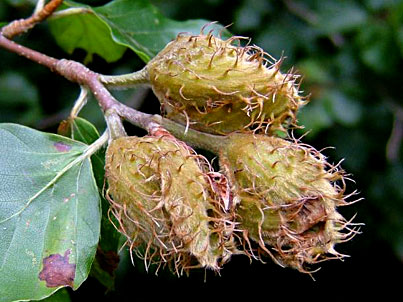So I didn't find out what kind of oak tree the acorns came from. But while I was investigating, I discovered something else puzzling. The book identified oak trees as a member of the beech family. I thought that was pretty bizarre because their leaves look nothing like each other.
Beech leaves

Various types of oak leaves
Also, beech trees make beech nuts, which are fuzzy or prickly, while oak trees make acorns, which are smooth and hard.

Beech nuts

Acorns
So you would think, based on these easily observable tremendous differences, that oak trees and beech trees would be entirely separate from each other, right?
Nope. Oak trees are firmly entrenched as part of the beech tree family. Here's how the taxonomy breaks down:
- Kingdom: Plants
- Division: Spermotophyra (seed-bearing plants with true flowers)
- Class: Angiospermae (encased seeds)
- Subclass: Dicotylendonae (seeds with two "leaves"; hardwood trees)
- Super Order: Amentiferae (catkins or clustered flowers)
- Order: Fagales
- Fagales Family 1: Betulaceae (birch, alder, ironwood, musclewood)
- Fagales Family 2: Fagaceae (beech, oak)
- Genus: Fagus (beech)
- Genus: Quercus (oak)
That explains why the beech trees rule the family, but not why the Europeans put the oaks in the same family. Maybe they thought, since there were fewer oaks, they could get away with jamming them in with the beeches.
There are close to 10,000 species of trees on Earth. More than 1,000 are in the United States. With that many trees to work with, I guess people are bound to make some puzzling classification decisions.
Apparently, people review these classifications all the time and suggest that species should be put into different categories. They have to do a lot of research before people will agree to make the change. According to one in-depth article on the subject, researchers now conduct phylogenetic analysis and they also look at the genomic profile of a plant to help them decide where it belongs. These people are not goofing around. This article notes:
With respect to larger relationships, however, ... those within Quercus have also attracted renewed attention, initially in 1993 ... and again since 1997. ... No single new phylogenetically based scheme has, however, found favor and little resolution below the major groups has been essayed.
So, people are looking into it. Slowly. Maybe the classification will change. Maybe not. Tune in over the next, oh, 50 years or so to see what happens to the oaks and the beeches.
Sources
Michigan Forests Forever Teachers Guide, Michigan Tree and Shrub Species
Bill Cook, Michigan State University Extension Forester for the Upper Peninsula of Michigan, UP Tree Identification Key, The Oaks
University of Kentucky, Agricultural Communications Service, Scientific Classification of Trees: An Introduction for Wood Workers
St. Louis County Health Pollen and Mold Center, Beech Family (Fagaceae Family) - BEECH
R. Govaerts and D.G. Frodin, "About the Fagales," presentation, Royal Botanic Gardens, Kew
No comments:
Post a Comment
If you're a spammer, there's no point posting a comment. It will automatically get filtered out or deleted. Comments from real people, however, are always very welcome!